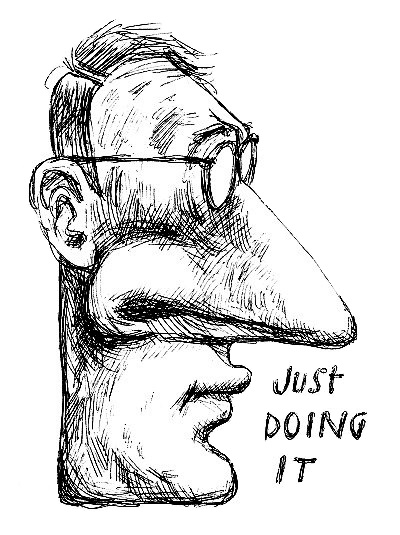To avoid living in the present, which is fraught with fear to the point of frantic dissociation, I am employing a technique known as visioning (which is basically a hallucination based on wishful thinking) to imagine a brave and hopeful future for myself after I've survived my personal version of freefall. My role model for this visioning process is Tom Hanks. No, I don't mean Forest Gump, although the temptation of saying eff it all and running across the midwestern plains has a certain appeal. No, the Tom Hanks character I am going to emulate is whatever the guy's name was in Castaway.
If you saw the movie, you remember he started out as a somewhat chunky normal guy. Then the plane crashed and he ended up castaway on a deserted island. He had to perform his own oral surgery. I don't plan to emulate that part. The memorable moment is what happens between the moment he conjures fire and the cut to the god-like creature he morphed into after a few years of surviving on fish and coconuts.I don't plan to start eating fish or coconuts. However, I do plan to morph into a god-like creature. God-dess. Whatever. Something other than what I am now.
I can use my time on the road as an opportunity to reinvent myself. I can be someone different. Like, really different. You might not even recognize me in two years, that's how different I could be. Minus the plane crash (or in my case, I hope, the car crash that always seems imminent), I'm envisioning myself as the svelte survivor I will be if we fastforward a couple years.
I will be thin. I will be smarter, somehow (not sure how that would happen, but I can hope). I will be able to get up from a chair without grimacing or grunting. My nose hairs will magically recede (but not back to my legs). I will be able to eat what normal people eat without getting sick, fat, or poor. Lactose intolerance will cease to be my nemesis. My cataracts will fade, my heart will settle into a steady rhythm, my bones will firm up, and this freight train in my head will roar off into the sunset, taking the typewriter tinnitus with it, never to be seen or heard again. I might even start to wear something other than black pajamas. Hey, as long as we're dreaming.
I don't expect all this to happen without my participation. First, of course, I will join a gym, because that is what people who want to reinvent themselves do. I might even go once in a while. Next, I will become a master of butane stove cuisine. I expect to be limited somewhat by lack of refrigeration, but if the planets align properly, I'll be able to get another power station to run my tiny portable camping fridge, currently languishing in my storage unit. There's nothing like powdered eggs cooked on a skillet in the frigid morning air. Nothing like it. I'm not sure what I will do about the hair migration problem. Even goddesses are allowed to shave their upper lips once in a while, right? I'm pretty sure.
The only hitch in my vision might be the three caped and hooded horseriders of my personal apocalypse: my health, my teeth, and my car. These three dudes siphoned a lot of money out of my bank account the past couple years. Copays and a colonoscopy, crowns and root canals, and new tires and front end work all ganged up to just about kill me. I don't expect these nasty dudes to back off entirely, but maybe if I figure out what sacrifices to perform to placate their supervisor, I might make it through another year without running out of cash. I can hope. I am totally future tripping these days, because that is where hope is. The past is out of reach. The present is far too uncertain and painful. So what else is there? I'm running forward, not looking back.



